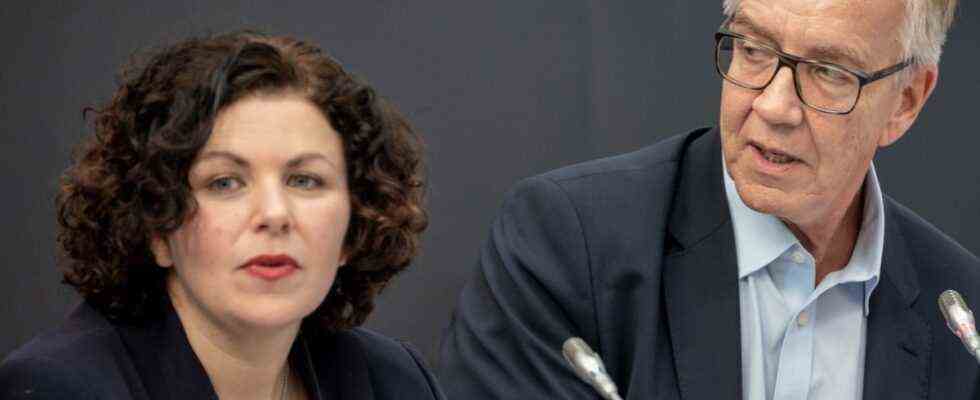One day before the constituent session of the new Bundestag, practically at the last moment, the Left also elected its new parliamentary group chairman. They are the old ones: Dietmar Bartsch, 63, and Amira Mohamed Ali, 41. After the election on Monday afternoon, Bartsch said: “We will go into the next legislature with renewed vigor.” Mohamed Ali spoke of a “very good meeting in great agreement”. It sounded a bit like the 2021 federal election never happened.
The left fell to 4.9 percent in this election. It was only thanks to three direct mandates that she made it back into the Bundestag, albeit with a greatly reduced team of 39 instead of 69 members. The party chairman Janine Wissler had said after this debacle that one could not simply go back to the agenda now. But apparently you can.
Bartsch and Mohamed Ali received exactly the same result in separate ballots. Both were confirmed in office with 76.9 percent of the votes. There were no opposing candidates. Mohamed Ali said: “I think we have made a big step today as a group”. The only question is: where to go?
Dietmar Bartsch had led the Left not only as a parliamentary group leader, but also as a top candidate in the federal election. It would not have been too bold to assume political responsibility for the disastrous result. This is also how a larger minority of his group sees it. The ultimately surprisingly good election result belies the extent of the frustration. However, all those who had believed in a signal of departure with a new double head up to the last underestimated Bartsch’s astonishing thick-skinnedness once again.
Critics wanted to dissuade Bartsch and Ali from doing so
Apparently, shortly after the election, the group leader had already counted through his own ranks and was sure of his loyalties. In addition to Bartsch’s own East German reformer camp, this also includes the formally left wing of the parliamentary group, in which Sahra Wagenknecht continues to pull the strings. Despite all the differences in content, Bartsch and Wagenknecht have for years formed a strategic power alliance that is often described as a horseshoe.
Thanks to this horseshoe, Mohamed Ali, who had been largely unknown until then, came to her managerial job two years ago. And although, as mockers say from their own ranks, it is not much better known to this day, it is now allowed to continue. Bartsch and Mohamed Ali have been able to assume a successful re-election for days. Correspondingly self-confident, they are said to have appeared in a special meeting of the party executive on Sunday.
This meeting was called by a particularly dissatisfied part of the federal executive with the aim of persuading Bartsch and Mohamed Ali to withdraw from the top of the parliamentary group. The corresponding application was rejected with 15 to eight votes. Better than the vote on Monday, which was probably also marked by the fatalism of the dissatisfied that the re-election of the parliamentary group chairmen could no longer be prevented anyway, the vote of the party executive illustrated the division of the left in key personalities.
Personnel issues are not decisive now, it is first a matter of a more in-depth analysis, say Bartsch and Mohamed Ali almost in unison – and in their own interest. But there are also influential leftists who see things differently. A few days ago, board member Jan van Aken called on Bartsch to resign via Twitter. It now needs “Dietmar’s wise insight to make space now in dignity for a new beginning.” The former party leader Bernd Riexinger, who still belongs to the Bundestag parliamentary group, also spoke out in public for a change at the top of the parliamentary group.
Mitigating circumstances apply to Wissler and Hennig-Wellsow
Klaus Ernst, another former party leader, in turn advocates having the entire party executive re-elected, including the female dual leadership around Janine Wissler and Susanne Hennig-Wellsow. But they have only been in office for eight months, which is why large parts of the party grant them extenuating circumstances.
It looks different with someone like Bartsch, who has been with us in various management positions for decades. The fact that he still saw the opportunity to take over the group chairmanship is also due to a lack of serious alternatives. It is true that there is great sympathy in the left-wing parliamentary group for a dual leadership made up of Wissler and the parliamentary manager Jan Korte. But Wissler simply did not want to, she apparently feels that she is busy enough with the party chairmanship. And Korte is considered one of the most loyal among the Bartsch loyals, he would probably only reach for the parliamentary group chairmanship on the day on which his political foster father voluntarily resigned.
There are also members of the Left who could have imagined another castling. Accordingly, Bartsch could have made the waiver of the parliamentary group chairmanship palatable with the office of Bundestag Vice President. Then Petra Pau, of all people, would have had to believe in it, who enjoys cross-party recognition as Vice President of the Bundestag. The left does not have much left of its caliber. And that would have been an extremely absurd sign of departure – everyone stays, except Pau.
On Monday, Petra Pau was elected by her left-wing parliamentary group with 92.1 percent of the votes as a candidate for the Bundestag Vice-Presidency.

